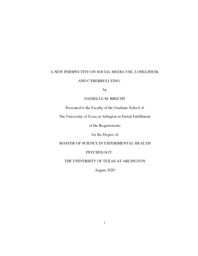| dc.description.abstract | The rates of social media use, cyberbullying, and loneliness are interrelated and simultaneously on the rise. Applying Jensen-Campbell’s Stress Model of Peer Victimization (Knack, Jensen-Campbell, & Baum, 2011) and the Evolutionary Theory of Loneliness (Cacioppo & Cacioppo, 2018) it is proposed that the negative health effects of social media may be attributed in part to chronic loneliness and cyberbullying. When lonely people recognize a lack of beneficial relationships (i.e., salutary relationship postulate) it may cause their behaviors to become more self-focused (i.e., self-preservation postulate) and they may use social media to fulfill the social disconnect by engaging in cyberbullying perpetration (i.e., selfishness and spiteful behavior). At the same time, lonely individuals in a cyber context may become vulnerable targets due to a lack of supportive connections, potentially increasing their risk of being cyber victims. Specifically, it is expected that there would be a stronger predictive relationship between cyber-perpetration and loneliness for image-based or selfish apps (Instagram) than for word-based apps (Twitter). Also, it was estimated that for lonely individuals increased social media use would predict cyber victimization relative to perpetration resulting in the prediction of poorer physical and mental health outcomes. Finally, it was expected that perceptions of social support would buffer the unique effects of loneliness on poorer physical and mental health outcomes. To test the hypothesized relationships, 393 college students from a Southern University completed online questionnaires. Overall, loneliness predicted greater levels of perpetration deception, total victimization, and public humiliation, malice, and deception victimization, as well as several health outcomes including physical symptoms, depression, perceived stress, state anxiety, and trait anxiety. Also, perpetration predicted physical symptoms, depression, trait and state anxiety, whereas victimization behavior predicted perceived stress and malice victimization predicted state anxiety. However, as not anticipated, time spent on Instagram or Twitter did not moderate the relationships between loneliness and cyberbullying behaviors, or physical and mental health outcomes. Finally, contrary to what was hypothesized, cyberbullying behaviors and social support did not mediate the relationship between loneliness and physical and mental health outcomes, including obesity, physical symptoms, depression, perceived stress, state anxiety, or trait anxiety. The results obtained from the current study support the importance of monitoring students for signs of loneliness, as well as educating college students about digital citizenship to prevent and decrease cyberbullying behaviors to improve an individual’s physical and mental health. | |


